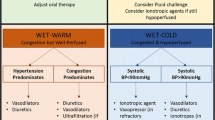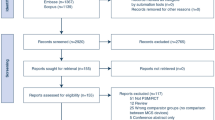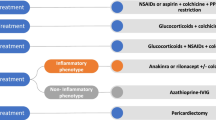Abstract
Objectives
Off-pump cardiac bypass grafting (OPCABG) has reduced in numbers as some studies suggest no clinical benefit and greater technical difficulty compared to on-pump operations. We examined the inflammatory changes due to extracorporeal circulation and compared the outcomes of patients undergoing OPCABG, on-pump CABG and single cardiac valve replacement with mechanical one.
Methods
Sixty-six elective patients who had severe coronary vessel disease requiring coronary artery bypass were allocated to two groups. The 1st group underwent OPCAB and the other one on-pump coronary artery bypass. A third group of 33 patients presented with single valve disease and underwent mechanical valve replacement were included in our study. Pre- and postoperative serum levels of 15 markers of acute phase inflammatory response were analysed. Postoperative complications were also recorded.
Results
Both on-pump and off-pump coronary bypass techniques provoked biochemical and enzymatic alterations, with more systemic inflammations which correlate with more complications and worse outcome in the on-pump group. Mechanical valve implantation also provoked more systemic inflammation, possibly due to foreign bodies in the systemic circulation.
Conclusion
Our results suggest that off-pump bypass induce a lesser inflammatory response and have better outcomes to on-pump bypass and valve replacement operations.








Similar content being viewed by others
References
Gruys E, Toussaint MJM, Niewold TA, Koopmans SJ. Acute phase reaction and acute phase proteins. J Zhejiang Univ Sci B. 2005;6:1045–56.
Preeshagul I, Gharbaran R, Jeong KH, et al. Potential biomarkers for predicting outcomes in CABG cardiothoracic surgeries. J Cardiothorac Surg. 2013;8:176.
Kim T, Arnaoutakis GJ, Bihorac A, et al. Early Blood Biomarkers Predict Organ Injury and Resource Utilization Following Complex Cardiac Surgery. J Surg Res. 2011;168:168–72.
Fontes ML, Amar D, Kulak A, et al. Increased preoperative white blood cell count predicts postoperative atrial fibrillation after coronary artery bypass surgery. J Cardiothorac Vasc Anesth. 2009;23:484–7.
Gravlee GP, Davis RF, Kurusz M. Cardiopulmonary bypass: Principles and practise. 3rd ed. Philadelphia: Lippincott Williams & Wilkins; 2007.
Onorati F, Rubino AS, Nucera S, et al. Off-pump coronary artery bypass surgery versus standard linear or pulsatile cardiopulmonary bypass: endothelial activation and inflammatoryresponse. Eur J Cardiothorac Surg. 2010;37:897–904.
Gäbel J, Westerberg M, Bengtsson A, Jeppsson A. Cell salvage of cardiotomysuction blood improves the balance between pro- and antiinflammatory cytokines after cardiac surgery. Eur J Cardiothorac Surg. 2013;44:506–11.
Drapalova J, Kopecky P, Bartlova M, et al. The influence of deep hypothermia on inflammatory status, tissue hypoxia and endocrine function of adipose tissue during cardiac surgery. Cryobiology. 2014;68:269–75.
Sepehripour AH, Harling L, Ashrafian H, Casula R, Athanasiou T. Does off-pump coronary revascularization confer superior organ protection in re-operative coronary artery surgery? A meta-analysis of observational studies. J Cardiothorac Surg. 2014;9:115.
Puskas J, Cheng D, Knight J, et al. Off-pump versus conventional coronary artery bypass grafting: A meta-analysis and Consensus Statement from the 2004 ISMICS consensus conference. Innovations (Phila). 2005;1:3–27.
Gasz B, Benkö L, Jancsó G, et al. Comparison of inflammatory response followingcoronary revascularization with or without cardiopulmonary bypass. Exp Clin Cardiol. 2004;9:26–30.
Laffey JG, Boylan JF, Cheng DC. The systemic inflammatory response to cardiac surgery: implications for the anaesthesiologist. Anesthesiology. 2002;97:215–52.
Prieto MA, Guash S, Mendez JC, Munoz C, Planas A, Reyes G. Does use of cell saver decrease the inflammatory response in cardiac surgery? Asian Cardiovasc Thorac Ann. 2013;21:37–42.
Rogers CA, Pike K, Angelini GD, et al. An open randomized controlled trial of median sternotomy versus anterolateral left thoracotomy on morbidity and health care resource use in patients having off-pump coronary artery bypass surgery: the Sternotomy Versus Thoracotomy (STET) trial. J Thorac Cardiovasc Surg. 2013;146:306–16.
Yuruk K, Bezemer R, Euser M, et al. The effects of conventional extracorporealcirculation versus miniaturized extracorporeal circulation on microcirculation during cardiopulmonary bypass-assisted coronary artery bypass graft surgery. Interact Cardiovasc Thorac Surg. 2012;15:364–70.
Kuss O, Börgermann J. Do higher-risk patients benefit from off-pump coronary artery bypass grafting? Evidence from an ecologic analysis of randomized trials. J Thorac Cardiovasc Surg. 2011;142:e117–22.
Ng CS, Arifi AA, Wan S, et al. Ventilation during cardiopulmonary bypass: impact on cytokine response and cardiopulmonary function. Ann Thorac Surg. 2008;85:154–62.
Ji Q, Ding W, Mei Y, Wang X, Feng J, Cai J. Protective effects of tight glucose control during cardiopulmonary bypass on myocardium in adult nondiabetic patients undergoing valve replacement. Can J Cardiol. 2014;30:1429–35.
Duncan AE, Abd-Elsayed A, Maheshwari A, Xu M, Soltesz E, Koch CG. Role of intraoperative and postoperative blood glucose concentrations in predicting outcomes after cardiac surgery. Anesthesiology. 2010;112:860–71.
Hebert PC, Wells G, Blajchman MA, et al. A multicenter, randomized, controlled clinical trial of transfusion requirements in critical care. Transfusion Requirements in Critical Care Investigators, Canadian Critical CareTrials Group. N Engl J Med. 1999;340:409–17.
Quattara A, Lecomte P, Le Manach Y, et al. Poor intraoperative blood glucose control is associatedwith a worsened hospital outcome after cardiac surgery in diabeticpatients. Anesthesiology. 2005;103:687–94.
Gandhi GY, Nuttall GA, Abel MD, et al. Intraoperative hyperglycemia and perioperativeoutcomes in cardiac surgery patients. Mayo Clin Proc. 2005;80:862–6.
Maccallum NS, Finney SJ, Gordon SE, Quinlan GJ, Evans TW. Modified criteria for the systemic inflammatory response syndrome (SIRS) improves their utility following cardiac surgery. Chest. 2014;145:1197–203.
Acknowledgments
Our acknowledgments are to the staff of the Immunopathology Laboratory of Onassis Cardiac Surgery Centre of Athens, Greece for their unselfish help.
Author information
Authors and Affiliations
Corresponding author
Ethics declarations
Conflicts of interest
The authors declare that they have no conflict of interest.
Funding
This research was not supported by external funding.
Additional information
The research was carried out at Hippokrateio General Hospital of Athens, Greece.
Rights and permissions
About this article
Cite this article
Chlapoutakis, S., Singh, S.A., Trakas, N. et al. Acute phase proteins and inflammatory factors: the peri-operative changes in on-pump versus off-pump cardiac surgery. Indian J Thorac Cardiovasc Surg 33, 205–212 (2017). https://doi.org/10.1007/s12055-017-0544-8
Received:
Revised:
Accepted:
Published:
Issue Date:
DOI: https://doi.org/10.1007/s12055-017-0544-8




